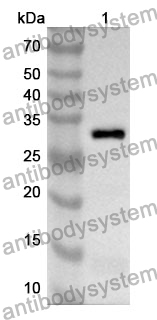Catalog No.
PHD25901
Species reactivity
Human, Mouse, Rat
Host species
Rabbit
Isotype
IgG
Clonality
Polyclonal
Immunogen
E. coli - derived recombinant Human PTPN2 (Met1-Gly257).
Tested applications
ELISA: 1:4000-1:8000, IHC: 1:50-1:100, WB: 1:1000-1:4000
Target
Tyrosine-protein phosphatase non-receptor type 2,TCPTP,T-cell protein-tyrosine phosphatase,PTPT,PTPN2
Purification
Purified by antigen affinity column.
Accession
P17706
Applications
ELISA, IHC, WB
Form
Liquid
Storage buffer
0.01M PBS, pH 7.4, 50% Glycerol, 0.05% Proclin 300.
Stability and Storage
Use a manual defrost freezer and avoid repeated freeze thaw cycles. Store at 2 to 8°C for frequent use. Store at -20 to -80°C for twelve months from the date of receipt.
Dual Conjugation of Long- and Medium-Chain Fatty Acids to BimBH3 Peptide Yields Ultra Long-Acting Inhibitors of Intracellular PTPN1/2., PMID:40458949
Haploinsufficiency in PTPN2 leads to early-onset systemic autoimmunity from Evans syndrome to lupus., PMID:39028869
Small molecule. Big biology. Dual phosphatase inhibitor enters the immunotherapy fray., PMID:37982351
The PTPN2/PTPN1 inhibitor ABBV-CLS-484 unleashes potent anti-tumour immunity., PMID:37794185
CTLA4, SH2B3, and CLEC16A diversely affect the progression of early islet autoimmunity in relatives of Type 1 diabetes patients., PMID:36622793
Genetic basis of defects in immune tolerance underlying the development of autoimmunity., PMID:35979360
Combination Approaches to Target PD-1 Signaling in Cancer., PMID:35911672
Non-HLA Gene Polymorphisms in the Pathogenesis of Type 1 Diabetes: Phase and Endotype Specific Effects., PMID:35812428
Associations between deduced first islet specific autoantibody with sex, age at diagnosis and genetic risk factors in young children with type 1 diabetes., PMID:35403376
Mesenchymal Stem Cell-Secreted TGF-β1 Restores Treg/Th17 Skewing Induced by Lipopolysaccharide and Hypoxia Challenge via miR-155 Suppression., PMID:35313652
Human umbilical cord mesenchymal stem cells alleviate the imbalance of CD4+ T cells via protein tyrosine phosphatase non-receptor type 2/signal transducer and activator of transcription 3 signaling in ameliorating experimental autoimmune thyroiditis in rats., PMID:35153255
PTPN2 Regulates the Interferon Signaling and Endoplasmic Reticulum Stress Response in Pancreatic β-Cells in Autoimmune Diabetes., PMID:35044456
Mapping Autoantibodies in Children With Acute Rheumatic Fever., PMID:34335616
PTPN2 Regulates Interactions Between Macrophages and Intestinal Epithelial Cells to Promote Intestinal Barrier Function., PMID:32652144
Type 1 diabetes linked PTPN22 gene polymorphism is associated with the frequency of circulating regulatory T cells., PMID:31808541
Identification and Characterization of Post-activated B Cells in Systemic Autoimmune Diseases., PMID:31616406
Longitudinal Pattern of First-Phase Insulin Response Is Associated With Genetic Variants Outside the Class II HLA Region in Children With Multiple Autoantibodies., PMID:31591105
An Overview of Celiac Disease in Childhood Type 1 Diabetes., PMID:30214462
Loss of B-Cell Anergy in Type 1 Diabetes Is Associated With High-Risk HLA and Non-HLA Disease Susceptibility Alleles., PMID:29343548
PTPN2-deficiency exacerbates T follicular helper cell and B cell responses and promotes the development of autoimmunity., PMID:27658548
Polymorphisms in STAT-4, IL-10, PSORS1C1, PTPN2 and MIR146A genes are associated differently with prognostic factors in Italian patients affected by rheumatoid arthritis., PMID:27342690
The Clinical Relevance of the IBD-Associated Variation within the Risk Gene Locus Encoding Protein Tyrosine Phosphatase Non-Receptor Type 2 in Patients of the Swiss IBD Cohort., PMID:26928573
Non-HLA gene effects on the disease process of type 1 diabetes: From HLA susceptibility to overt disease., PMID:26074154
A multilocus genetic study in a cohort of Italian SLE patients confirms the association with STAT4 gene and describes a new association with HCP5 gene., PMID:25369137
TC-PTP directly interacts with connexin43 to regulate gap junction intercellular communication., PMID:24849651
A strategy to find gene combinations that identify children who progress rapidly to type 1 diabetes after islet autoantibody seroconversion., PMID:24249616
Characterization of PTPN2 and its use as a biomarker., PMID:23994241
Polymorphisms in STK17A gene are associated with systemic lupus erythematosus and its clinical manifestations., PMID:23860322
Autoimmune associations and autoantibody screening show focused recognition in patient subgroups with generalized myasthenia gravis., PMID:23792059
Complex multi-block analysis identifies new immunologic and genetic disease progression patterns associated with the residual β-cell function 1 year after diagnosis of type 1 diabetes., PMID:23755131
PADI4 and HLA-DRB1 are genetic risks for radiographic progression in RA patients, independent of ACPA status: results from the IORRA cohort study., PMID:23577190
Characteristics of rapid vs slow progression to type 1 diabetes in multiple islet autoantibody-positive children., PMID:23539116
Celiac disease in a child with ulcerative colitis: a possible genetic association., PMID:23314669
Investigation of the vitamin D receptor gene (VDR) and its interaction with protein tyrosine phosphatase, non-receptor type 2 gene (PTPN2) on risk of islet autoimmunity and type 1 diabetes: the Diabetes Autoimmunity Study in the Young (DAISY)., PMID:22960018
T cell protein tyrosine phosphatase attenuates T cell signaling to maintain tolerance in mice., PMID:22080863
Crohn's disease-associated polymorphism within the PTPN2 gene affects muramyl-dipeptide-induced cytokine secretion and autophagy., PMID:22021207
PTPN2, a candidate gene for type 1 diabetes, modulates pancreatic β-cell apoptosis via regulation of the BH3-only protein Bim., PMID:21984578
An interferon-induced helicase (IFIH1) gene polymorphism associates with different rates of progression from autoimmunity to type 1 diabetes., PMID:21270278
Confirmation of the genetic association of CTLA4 and PTPN22 with ANCA-associated vasculitis., PMID:19951419
The role of protein tyrosine phosphatases in the regulation of allergic asthma: implication of TC-PTP and PTP-1B in the modulation of disease development., PMID:19930043
Involvement of caspase 1 and its activator Ipaf upstream of mitochondrial events in apoptosis., PMID:16817903
Coordinated regulation of insulin signaling by the protein tyrosine phosphatases PTP1B and TCPTP., PMID:15632081
Site-selective regulation of platelet-derived growth factor beta receptor tyrosine phosphorylation by T-cell protein tyrosine phosphatase., PMID:14966296
Signal transducer and activator of transcription 3 is the dominant mediator of the anti-inflammatory effects of IL-10 in human macrophages., PMID:14688368
Cells previously desensitized to type 1 interferons display different mechanisms of activation of stat-dependent gene expression from naïve cells., PMID:14600148
COOH-terminal sequence motifs target the T cell protein tyrosine phosphatase to the ER and nucleus., PMID:7593185
Differential intracellular compartmentalization of phosphotyrosine phosphatases in a glial cell line: TC-PTP versus PTP-1B., PMID:8112824

